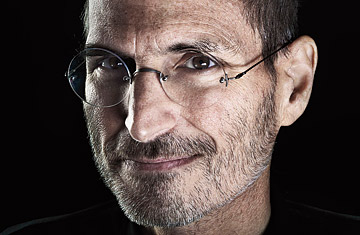
It is a gorgeous spring day when I arrive at the coolest address in the universe: 1 Infinite Loop, Cupertino, Calif., where Apple has been headquartered since 1993. The campus, for such they call it, is enormous yet not big enough to contain Apple's current rate of expansion. An additional site is being designed and built. After stocking up on "I visited the mothership" T-shirts at the company store (we fanboys are pathetic, I readily confess), I am shown around the canteen, lawns and public spaces. It is right to call this a campus, for everyone looks and dresses like a student. I should imagine the only people ever caught wearing suits here have been visiting politicians.
Phil Schiller and Eddy Cue are suitably bejeaned and relaxed as they welcome me for a talk about the iPad, Apple's new product, which will be launched in a week and a half. Schiller is senior VP of worldwide product marketing, responsible for delivering Apple's latest baby. Cue is VP of Internet services, overseeing the iTunes, App and iBook online stores.
I am here at Apple's invitation to try out the iPad, and later in my visit I will spend an hour with the company's boss, Steve Jobs--the first time I've ever spent any real time with him. But as I meet with Schiller and Cue, I feel it only fair to reel off the list of negatives the iPad will meet on its release. It falls between two stools--neither small enough to be truly portable nor big enough to be called a proper computer. Everything, I point out, is under Apple's control, as usual. No Adobe Flash capability, no multitasking, no camera. It's just a scaled-up iPhone or iPod Touch.
"There's a negative way of saying that," says Schiller, "and a positive. 'Oh, it's just a big iPhone ... boo!' or 'Hey, it's like a big iPhone ... cool!' Luckily, millions of people have those, so there is an instant ease and familiarity when they first encounter the iPad. As for everything else, it's not about the features--it's about the experience. You just have to try it to see what I mean."
I, of course, am itching to try it, but first Cue takes me through the iBook application and its online store. There has been much talk of the iPad's dealing a death blow to Amazon's Kindle reader; publishers, it seems, have long yearned to escape from Amazon's tough control over pricing. I asked John Makinson, chairman and chief executive of Penguin, why he's so keen on the iPad. He told me he likes the fact that "it gives control back to us and allows us to discover how the market is developing. Frankly, when I saw the iPad, it was like an epiphany ... This has to be the future of publishing. You'll know if you've spent any time with one." "Yes," I say. "I hope to try one out soon." Tracy Futhey, of Duke University, is similarly optimistic about the iPad's potential in education. "The iPad is going to herald a revolution in mashing up text, video, course materials, student input ... We are very excited," she says. "Have you tried it?" "Er ... Not yet."
